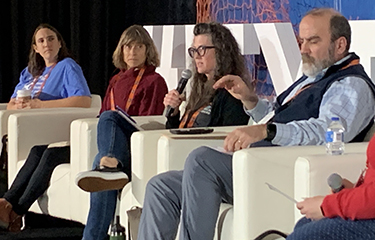The stunning collapse of Bering Sea crab is an extreme example of climate change dangers already underway in other fisheries – and should shape how scientists, managers, and fishermen plan to respond, according to Sarah Schumann, coordinator of the advocacy campaign Fishery Friendly Climate Action.
“The crabbers here did not ask to be the poster children for climate change, but that is the role that has befallen them,” Schumann said at a panel at Pacific Marine Expo in Seattle, Washington, U.S.A. in November 2022.
“The signal is unmistakable” that climate shifts are affecting other U.S. fisheries as well, she said.
The panel discussion on North Pacific environmental trends centered on the first-ever total shutdown of the opilio crab fishery, ordered 10 October, 2022. Climatic factors are suspected as a key component, but the picture is far from clear, according to Scott Goodman, executive director of the Bering Sea Fisheries Research Foundation.
“We can’t definitely say this is about climate change,” Goodman said.
High numbers of opilio through 2018 were followed by an apparent collapse in 2019, with an estimated net loss of 2.5 billion juvenile crab, Goodman said. A year of missing data in 2020, when surveys could not be conducted because of the Covid-19 pandemic, has made it difficult to determine what caused the crash. Then, in 2021 to 2022, the two lowest abundances on record were recorded in the fishery.
“More crabs than ever in 2018, fewer crabs than ever in 2022,” Goodman said.
The big “pulse” in crab numbers could have brought on factors in their following decline, such as crowding, disease, and crab-on-crab predation. Warmer water brings on metabolic changes in crabs that contributed to their demands on the food chain, because “lots of crabs need lots of food,” Goodman said. Opilio crab have also been subjected to more predation from cod as temperature barriers have fallen, allowing the fish to range farther, he said.
Warning lights were flashing for the crab fishery in 2021 with the first Bristol Bay red king crab closing in 25 years, and grim forecasts for king and opilio survey results into summer 2022. The closures announced in October 2022 leave only a limited tanner crab fishery that may attract two or three vessels from a usually 60-strong fleet, according to Jamie Goen, executive director of the Alaska Bering Sea Crabbers Association, resulting in a projected USD 500 million (EUR 472 MILLION) loss in revenue..
“It goes way beyond the numbers,” Goen said. Captains, crews, and families that have built lives and identity around the crab industry now see that all under threat, she said.
“Right now, it’s Bering Sea crab in crisis,” but cod and Yukon and Kuskokwim salmon have all shown signs of trouble, Goen said.
The crabbers plan to “fight like hell and get our crabs and fishing back,” she said.
Fishermen are pressing for federal relief aid to come within six months, not years, treated as an emergency at the same level as hurricane recovery and farm crop failures, Goen said.
In the long-term, adaptive resource management is needed for immediate response to bring new conservation measures to bear for protecting the crab resource, said Goen.
“Continued science and research must press forward to determine how the collapse can be addressed – but that need should not delay action. Managers need to take action now,” said Goen, whose group has called for new restrictions on other fisheries with crab bycatch. “We have enough information to make this happen.”
Responding to the changes in the North Pacific requires more understanding of “what is going on as stocks shift,” Goodman said. Then management needs to be more flexible.
“All of our management is currently based on what’s happened in the past,” he said.
Reporting by Kirk Moore
Photo courtesy of Kirk Moore/National Fisherman







